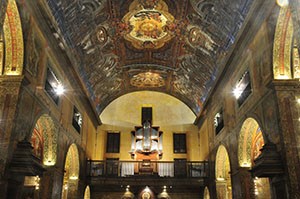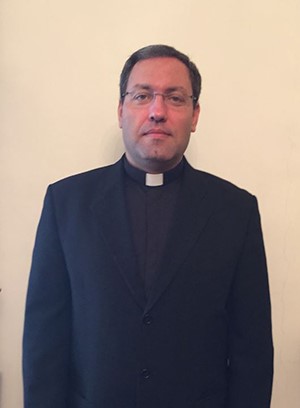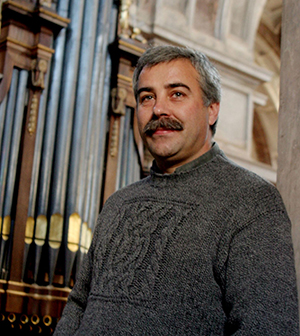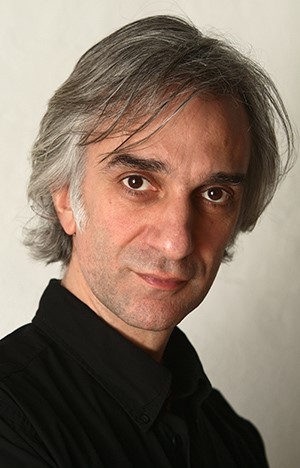|
Pe. Ignacio Ferreira, Dinarte Machado and João Vaz (lecture) The organ in the Autonomous Region of Madeira Further to the conferences organized in 2012 and 2013, in which a panorama of the presence of the organ in Portuguese history was traced, through testimony left over the course of the centuries, and in which the current situation of the organ in the liturgy was discussed, within the context of understanding the instrument itself and the role it has taken on a different times in history, this lecture aims to assess the activities carried out in the Autonomous Region of Madeira during the last decades and to open paths for the future of the use of the organ, bearing in mind the cultural and liturgical needs of today and the variety of instruments with which the churches of Madeira are endowed. |
Participants
|
Fr Ignácio Victor Figueira Rodrigues was born in Caracas, Venezuela. He entered the Diocesan Seminary of Funchal in 1996, at the age of 24. He studied philosophy for two years at the Theological School of the Funchal Seminar. From the third year of theology onwards, he continued at the Seminary of Christ the Kin in Olivais, Lisbon. In 2005 he studied Gregorian chant and completed the introductory course at the Pontifical Institute of Sacred Music in Rome, in order to take the course in composition of sacred music. He was ordained priest on 30 July 2005, in the Cathedral of Funchal, by Bishop Teodoro de Faria. In 2006 he was sent to Paris as chaplain of the Portuguese Community of St Francis Xavier. He attended the École Normale de Musique in Paris, , where he studied piano with Michael Wladowski and Odile Delangle, keyboard harmony with Narcis Bonet, harmony and composition with Roselyne Masset-Lecocq, analysis with Narcis Bonet and Jean-Dominique Pasquet, history of music with Franck Tourre and musical training with Catherine Maffel. He is currently parochial vicar and chapel master of the Cathedral of Funchal, and in charge of sacred music. He is professor of music at the Seminary of Our Lady of Fátima and at the School of Ministry of the Diocese of Funchal and member of the Liturgical Diocesan Team.
|
|
Music has been part of Dinarte Machado’s life from an early age, and his first experience of pipe organs was at the age of twenty, on account of the urgent necessity of restoring the organ of the Church of St George, in the Northeast, on the island of S. Miguel, where he grew up. In 1987 he set up a workshop in Ponta Delgada, concentrating exclusively on organ building, undertaking his first restoration, that of the Church of Ribeira Grande, on S. Miguel. There followed other restorations in the Azores, Madeira, mainland Portugal and Spain, and to date he has carried out seventy-seven restorations of historical organs, the great majority of them Portuguese, from the second half of the 18th century, in which field he is a specialist. In the field of organ building, he has constructed some small instruments for study and has built nine larger organs, such as that made for the Church of the Colégio in Funchal. He published inventories of the organs of the Azores and Madeira. In 1993, he worked in Spain with the master organ builder Gerhard Grenzing, on the restoration of the historic organ of the Royal Palace in Madrid. At the International Congress in Mafra in 1994, he demonstrated the existence of differences between Spanish and Portuguese organs from the second half of the 18th century onwards. He was responsible for the restoration of the six organs of the Basilica of Mafra, built during the reign of King John VI, a set unique in the world, and which represents the apogee of Portuguese organ building. The work was begun on 15 May 2010, and given a Europa Nostra Prize on 1 June 2012. In July 2010 he was awarded the Order of Merit by the President of the Portuguese Republic. In 2014 he has finished the restoration of the largest organ built in Portugal, the historic organ of the Monastery of Lorvão. |
|
Born in Lisbon, João Vaz holds a doctorate in music and musicology from the University of Évora, where his thesis was entitled The organ works of Brother José Marques e Silva (1782-1837) and the end of the organ tradition in Portugal during the Ancien Regime, written under the supervision of Rui Vieira Nery. He holds a diploma in organ from the Higher School of Music of Lisbon, where he studied under Antoine Sibertin-Blanc, and from the Higher Conservatory of Music of Aragon in Zaragoza, where he studied with José Luis González Uriol, on a grant from the Gulbenkian Foundation, and also has a licentiate in architecture from the Technical University of Lisbon. He has been extremely active internationally, both as performer and teacher on organ courses. He has made over ten solo recordings, especially on historical Portuguese instruments. As performer and musicologist he has concentrated particularly on Portuguese sacred music, founding in 2006 the ensemble Capella Patriarchal, which he directs. His publications include articles that concentrate above all on Portuguese keyboard music, he currently teaches organ at the Higher School of Music in Lisbon, having also taught at the Gregorian Institute of Lisbon, the University of Évora and the School of Arts of the Portuguese Catholic University. Founder of the International Organ Festival of Lisbon in 1998, he is currently artistic director of the concert series that take place using the six organs of the Basilica of the Palace of Mafra (to whose restoration he was permanent consultant) and of the historical organ of the Church of São Vicente de Fora, in Lisbon (of which he became titular organist in 1997). |
 Tuesday, 13 October, 18.00, p.m.
Tuesday, 13 October, 18.00, p.m.  Fr Ignácio Victor Figueira Rodrigues
Fr Ignácio Victor Figueira Rodrigues Dinarte Machado
Dinarte Machado João Vaz
João Vaz